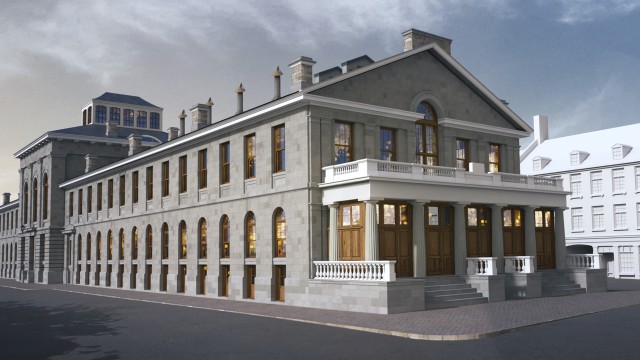19th Century Montréal — The 3D Experience – High Schools

The Montréal of yesteryear
Take a voyage of discovery back to the 19th century, a key period for the city of Montréal and a major turning point in its economic, political, and social history. With this tour and activity, students get to explore the century’s major historical changes—changes that shaped the city’s urban landscape and population in lasting ways.
Through 3D modeling and the viewing of archaeological remains, young people are truly immersed in the past. They’ll learn how Montréal, then the country’s capital, was built and developed over time. A legacy that can still be seen today at Pointe-à-Callière.
The activity is split into two parts: a journey through the 19th century archaeological remains on display at Pointe-à-Callière, and a digital experience giving visitors an opportunity to explore the exceptional archaeological site of the Parliament of the Province of Canada (1844-1849), via 3D modeling. An exciting immersion that connects the past and the present, history and innovation.
At the end of the tour, students will have a more comprehensive view of Montréal’s history. They will have travelled to the heart of major events in 19th century history that impacted the way the city is organized—industrialization, immigration, the evolution of living conditions, and Montréal’s political life.
Competencies developed
The activities taking place as part of this visit are in keeping with government school programs and help develop certain subject-specific competencies.
Links with the Quebec school training program
Social Sciences — History of Québec and Canada — High School
Competencies:
Characterize a period in the history of Québec and Canada (1791 - 1840)
Interpret a social phenomenon
Historical knowledge:
Constitutional Act
-Legislative Assembly and Legislative Council
-Territories of Lower Canada and Upper Canada
Parliamentary debates
-Authority of the governor
-Subjects debated in the Legislative Assembly
-Political parties
-Newspapers
Nationalism
-Linguistic duality
-British and Canadian nationalism
-Composition of the population in Lower Canada and Upper Canada
Agriculture
-Corn Laws
Migratory movements
-Epidemics and quarantine
-Migration to cities
Durham Report
Specific concepts:
-Bourgeoisie -Nationalism -Parliamentarism
Competencies:
-Characterize a period in the history of Québec and Canada (1840- 1896)
-Interpret a social phenomenon
Historical knowledge:
Act of Union
-Socio-political and economic context
-Political structure
Responsible government
Migration
-Rural exodus
-Transatlantic immigration
Industrialization
-Division of labour
-Living and working conditions of men, women, and children
-Workers’ movement
-Urbanization
Specific concepts:
-Federalism
-Industrialization
-Migration
Information and reservation
Please fill out our online form and we will contact you shortly to complete your reservation.
For any assistance:
[email protected]
514 872-9127
Please note that we cannot guarantee a booking request made less than 4 weeks in advance.
Hours and rates of visits and group activities (taxes included)
September 2025 to April 2026
Tuesday to Friday, 9:30 am to 5 pm
May-June 2026
Tuesday to Friday, 9:30 am to 5 pm
+ Mondays, June 1st, 9 and 15, 2026 (subject to change without notice)
Role of accompanying adults
Divide the group into smaller sub-groups according to the number of groups specified on your reservation. The number of groups required corresponds to the number of accompanying adults required during the visit.
Follow the group at all times to maintain discipline and manage particular cases. The mediator or guide will lead the visit. Accompanying adults must stay with and supervise the group during lunch time.
Lunch room
A lunch room is available for groups.
Reservations required.
Reservation confirmation
You will receive an email confirming your reservation. Please sign it and return it to the Museum by email within five (5) days of its receipt.
Cancellation
In the event of a cancellation, please return your confirmation document by email, mentioning CANCELLED on the copy.
— A cancellation without penalty will only be accepted more than 30 days before the scheduled activity date.
— For a cancellation between 15 and 30 days before the scheduled activity date, you will be billed for 50% of the amount of your reservation.
— For a cancellation 14 days or less before the scheduled activity date, you will be billed for the full amount (100%) of your reservation.
Final confirmation of the number of participants
You must confirm the exact number of participants no later than ten (10) business days before the scheduled Museum activity. You will be billed for this number of participants.
Payment
The total amount is payable 10 days after your presentation. Please make your cheque payable to Pointe-à-Callière.
Access to the Museum
Consult instructions.
There is free bus parking on de la Commune Street, south side, in front of the Éperon building.
